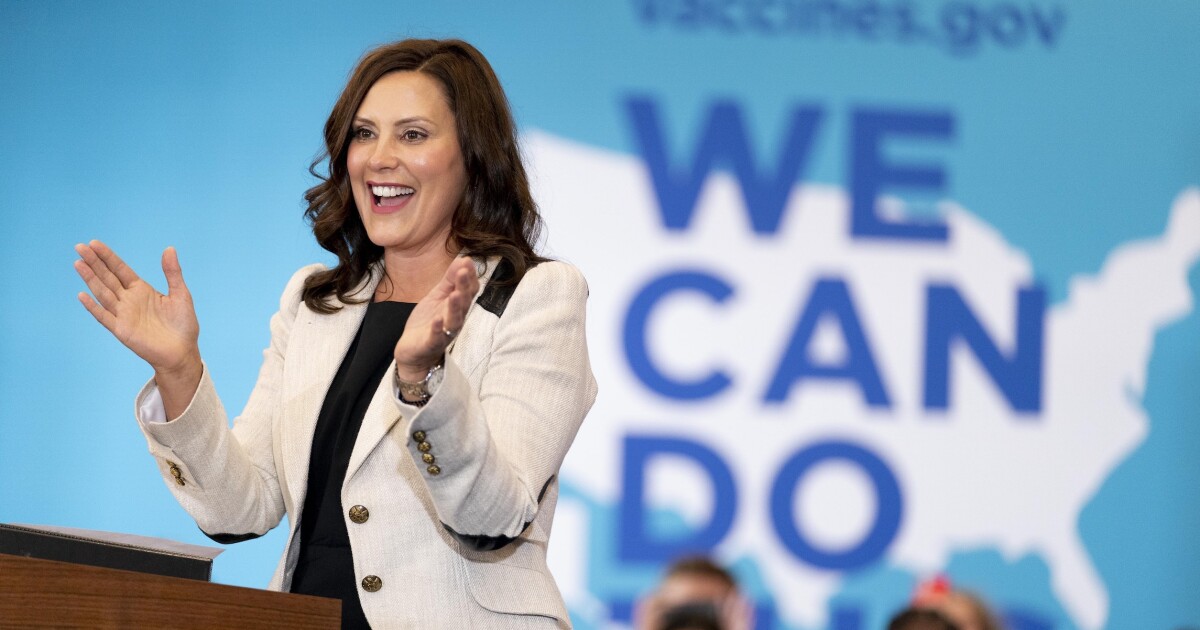

Gov. Gretchen Whitmer (D-MI) is clobbering a collection of possible Republican challengers in fresh polling. Some Republican insiders aren’t surprised.
When I checked in with a few of my most dialed-in GOP strategists Wednesday, in Michigan and Washington, they ruefully conceded that Whitmer is positioned to win reelection this November. That is despite the fact that plenty of other Michigan Democrats are hardly immune from a toxic political climate that could propel Republicans to a takeover of the House and Senate in the midterm elections.
Republicans monitoring the Michigan gubernatorial race are chalking up their Midwest misfortune to the bad luck of being stuck with a bunch of mediocre candidates, although they are carving out a possible exception for businesswoman and conservative media personality Tudor Dixon. But when pressed, Republicans also admit that their other problem is Whitmer. As it happens, the first-term Democrat is a good politician.
Here is how one Republican operative in Michigan explained Whitmer’s resiliency to me:
“The GOP overreaction and clearly communicated hatred of her stemming from her COVID orders has allowed swing and independent voters to give her the benefit of the doubt,” this operative said. “Our hysterics over wearing a mask has undermined a very real message of incompetence on her nursing home policy that is the real crime we should be prosecuting on the campaign trail.”
CALIFORNIA GOV. NEWSOM STOKES 2024 TALK AS BIDEN’S POPULARITY FALLS
Of course, some Republicans do not equal all Republicans. There is a counterview on Whitmer’s political prospects.
Whitmer, 50, has spent early to bolster her reelection bid. And the Democratic Governors Association has reserved $23 million in television advertising for the fall to shield Michigan’s chief executive from a Republican challenge. Those are not the sorts of actions a campaign, or a party organization, takes if the incumbent in question has nothing to worry about, some GOP insiders emphasized gleefully when I asked them about this race.
“General election polling before early September is worthless,” a Republican insider with Michigan ties told me, saying of the new polling data that sparked our conversation: “Exactly what I would suspect when [the GOP] primary hasn’t gelled and candidates don’t have name recognition.” The Michigan GOP gubernatorial primary is scheduled for Aug. 2.
And what did the polling show, exactly?
The July 5-8 survey of likely voters, commissioned for the Detroit News and WDIV, showed Whitmer at 50% or above and handily beating every Republican primary candidate.
The governor led Dixon 51% to 40%; she led real estate broker Ryan Kelley, who was charged with participating in the Jan. 6 ransacking of the Capitol, 50% to 41%; she led pastor Ralph Rebandt 52% to 37%; she led businessman Kevin Rinke 52% to 40%; and she led chiropractor Garrett Soldano 52% to 38%. Notably, Whitmer scored a 55% job approval rating in the poll, a figure that hit 61% among independents.
Compare that to President Joe Biden, whose job approval in Michigan is cratering at 38% overall and 32% among independents. Related: Only 11% of voters in the state believe the United States is on the “right track,” with 79% saying the country is on the “wrong track.”
If Whitmer lives to see a second term under political conditions such as these, in a competitive and coveted presidential battleground such as Michigan’s, expect the drumbeat about the governor’s possible 2024 candidacy to begin within a nanosecond of her race being called.
Now, to the field …
Battle for the Senate. Democrats might be on their heels politically, but that is not stopping their Senate candidates from raking in campaign cash. Thanks to Ben Kamisar over at NBC News, I’m able to offer this handy cheat sheet for examining just how well funded Democratic Senate candidates, including incumbents and challengers, are going to be heading into the fall campaign. And make no mistake: Whatever the Democrats’ political obstacles, and they are considerable, a lack of resources will not be one of them. Here’s the second-quarter money tally so far for these Democrats:
- Arizona — Sen. Mark Kelly: $13.6 million. Republican nominee to be chosen in Aug. 2 primary.
- Florida — Rep. Val Demings: $12.2 million. She is challenging GOP Sen. Marco Rubio.
- Georgia — Sen. Raphael Warnock: $17.2 million. He is running against Republican nominee Herschel Walker.
- North Carolina — Former state Supreme Court Chief Justice Cheri Beasley: $7.4 million. She is running against GOP nominee Rep. Ted Budd.
- Ohio — Rep. Tim Ryan: $9.1 million. He is running against Republican nominee J.D. Vance.
- Pennsylvania — Lt. Gov. John Fetterman: $11 million. He is running against Republican nominee Dr. Mehmet Oz.
Republicans need win only one seat, net, to reclaim the Senate majority after a two-year absence. The existing 50-seat Democratic edge in the chamber rests on the tiebreaking vote wielded by Vice President Kamala Harris.
California’s 22nd Congressional District. Rep. David Valadao (R) has picked up an endorsement from the Tea Party Express, a conservative group that typically backs Republicans whose positions, or congressional voting records, could never be described as centrist. But Valadao is not your typical Republican.
In the past, he has defied the political odds and won election to a House district that voted Democrat for president. Post redistricting, Valadao is once again trying to win a seat drawn to elect Democrats, facing off against state Assemblyman Rudy Salas (D) in the newly configured 22nd Congressional District. For Republicans, it’s either Valadao or bust in this Central Valley seat. Perhaps that’s why the Tea Party Express is backing a Republican who voted to impeach former President Donald Trump in the waning days of his administration over his culpability for the Jan. 6 ransacking of the Capitol and who has a lifetime Club for Growth score of 48%.
“We are pleased to once again support David Valadao for Congress because he is a principled and hard-working conservative who has fought on behalf of the people of the Valley to ease burdensome regulations and high taxes to ensure California remains an international agricultural leader with jobs and prosperity for everyone,” Sal Russo, the group’s founder and chief strategist said in a statement.
CLICK HERE TO READ MORE FROM THE WASHINGTON EXAMINER
2024 Watch. Sen. Tim Scott (R-SC) is headed to Iowa.
The charismatic senator, who is black, is up for reelection in South Carolina this fall but is expected to win easily, after which he could turn his attention to a 2024 presidential bid. Scott, 56, typically downplays his interest in the White House, but Republican sources familiar with his thinking say he has been mulling a presidential bid for quite some time — and his late August visit to Cedar Rapids, Iowa, to headline the annual “Barbeque Bash” fundraiser for Rep. Ashley Hinson (R), isn’t necessarily a simple coincidence.
Scott first began generating 2024 speculation in 2020, when he delivered among the most well-received speeches on Trump’s behalf during the quadrennial GOP nominating convention. The thinking at the time was that either Trump would win reelection or fade to black the way most incumbent presidents do after being ousted. Obviously, neither happened, and the former president’s decision regarding 2024 could affect Scott.
But in the meantime, he’s likely to emerge from his 2022 Senate bid with plenty of money left over to seed a presidential bid.






